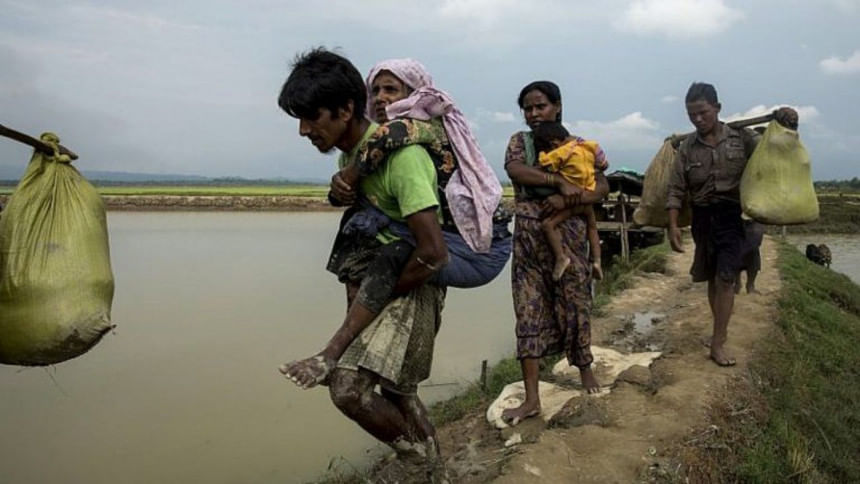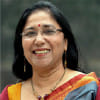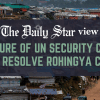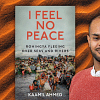What I saw in Ukhia

According to the latest UN report, nearly 400,000 Rohingya refugees have crossed over to Bangladesh. The Rohingya people, living in the Rakhine State of Myanmar, are fleeing their homes they have lived in for 200 years. Subject to discrimination for years and not recognised as citizens, the Rohingyas, the majority of whom are Muslims, have for so long been able to eke out a living on agriculture and small farming. With little expectations from the state to guarantee them equal rights, all they want is to till their own land, harvest their crops and live in peace and security.
Alas! That is not to be! Blamed for alleged terrorist attacks on police outposts and a military base last month, in which at least twelve members of the security forces were killed, the innocent civilian population is being subjected to the worst kind of persecution imaginable—termed by the UN as ethnic cleansing and by some public figures as genocide.
Myanmar's army under instructions from the very top has come after them with machine guns, firing from helicopters, and resorted to using mines and machetes. Brutally murdering, raping and burning down their homes, sparing no one—women, the elderly and children—prompting lakhs to flee the homes of their ancestors into Bangladesh. They have arrived in a country with no guarantee of food, water, sanitation or a decent life because saving their lives has been their only thought. Most have come empty-handed, without assets or money, with just the clothes on their backs. On the way, they have lost loved ones, witnessed atrocities such as looting, arson, women raped in the presence of family, and children murdered. Most recount harrowing stories of unimaginable brutality.
Going into Ukhia amidst its scenic beauty, what I witnessed reminded me of the many movies we have seen of mass exodus of people fleeing persecution, the Nazi extermination of Jews and the more recent plight of the Syrian refugees. Streams of people walking or sitting by the roadside with expressions of utter despair, tragedy and loss written on their faces. Women recounted how their children were killed while running; some talked of husbands or brothers taken away never to return; some just kept quiet, too numb, hungry and traumatised to speak. Who can forget the horrific photo of the half burnt body of a child barely alive in The Daily Star a few days ago?
The camp at Balukhali where thousands have taken refuge is nothing more than filthy, muddy pieces of land where thousands have taken shelter in makeshift tents comprised of thin plastic sheets slung over two bamboo poles. I saw several women holding babies, their eyes vacant, too weak to even ask for help. Children crying in hunger, burning with fever sitting on the muddy ground or lying listless in their mother's arms. As the Coast Trust van arrived with packets of cooked food, thousands ran towards it, extending their hands; those strong enough got them, the weak ones looked on helplessly. Some said they would take this packet to their families and share with five or six or even 10 members.
The sanitation situation is precarious. Due to open defecation, the likelihood of infectious diseases spreading is threatening the local population as well. Many have not showered for days prompting an outbreak of skin disease. The makeshift health centre is unable to cope with all this; all they can do is provide basic medicines such as paracetamol, salbutamol and orsaline for fever, respiratory infection, diarrhea, etc. Children are at risk of respiratory tract infection and will not recover unless provided with emergency hospital care.
But this camp, due to its concentration of people, is getting, however inadequate, some attention from aid agencies. What about the thousands walking aimlessly in search of help on two sides of the highway? The Marine Drive, as it is called, is stunningly beautiful with hills on one side and the sea on the other and can be compared to any beach in the south of France or the coast of Italy. The drive takes one to the Naf river, one of the routes the Rohingyas are taking to cross over. Here, one can see the border with Myanmar, lush, green, yet so unwelcoming to these people. Thick clouds of smoke can be seen, a grim reminder of the horror on the other side. It is then that I realised why they are coming to Bangladesh, why they have no other alternative but to flee. The smoke is from their burnt homes, from the exploding mines and the bombs being thrown from helicopters. Fleeing to an uncertain future, all they want is to save their lives, not to see their children killed, not be caught by soldiers to be taken away, raped and tortured.
On the wayside, I met Joitun, who has travelled for four days with four children accompanied by her old father. Her husband was dragged away, killed; she barely managed to escape with her life and the children.
"They would have killed us too," she says, "but I could run fast. Many were shot as I ran, I heard screams behind me, fires from the sky burnt our village." Neither she nor her children had eaten anything for a few days except some biscuit crumbs. Soon it would be night; she was standing alone, no food, shelter or place to sleep. Where would she go? How would she spend the night?
The story is the same everywhere I went. Total desolation, hopelessness with nothing to look forward to. Many compare their plight to ours in 1971 when 10 million of us became refugees in the neighbouring country. But it is not the same because then we had hope of returning someday to a free country. The Rohingyas have no country, no citizenship, nothing to go back to except death and persecution.
This is a huge humanitarian crisis for Bangladesh, one we have never faced before. Already hosting some 500,000 Rohingyas for the last 20 years, we are ill-equipped to take in anymore. Yet, we have opened our doors to them, what else could we do?
Now it is the turn of the international community to come good on their values of fundamental human rights and dignity for everyone. The principles enshrined in the Universal Declaration of Human Rights to which all countries have signed dictate that we don't turn our backs on them. We urge the rich countries to come forward and demonstrate that the values of equality, justice and peace they preach to the rest of the world are also binding on them.
Shaheen Anam is Executive Director, Manusher Jonno Foundation.










Comments